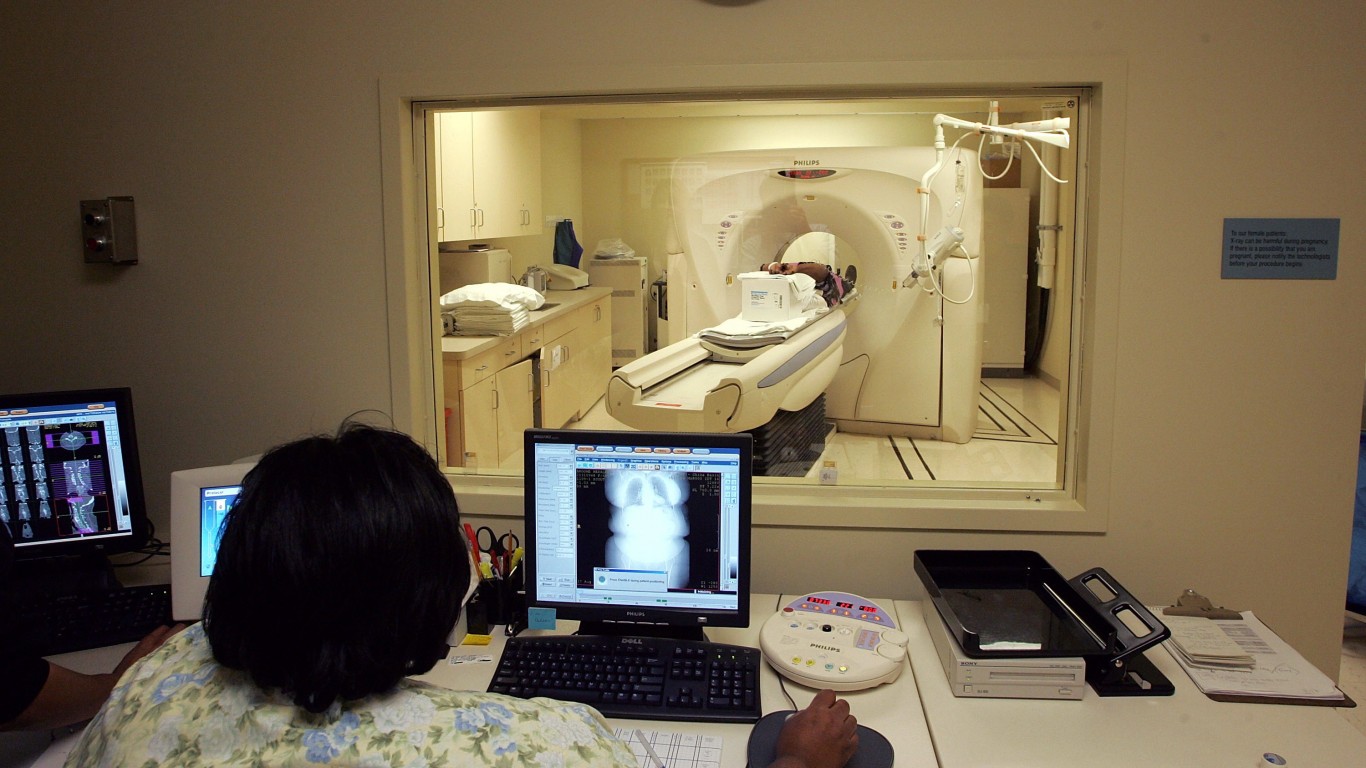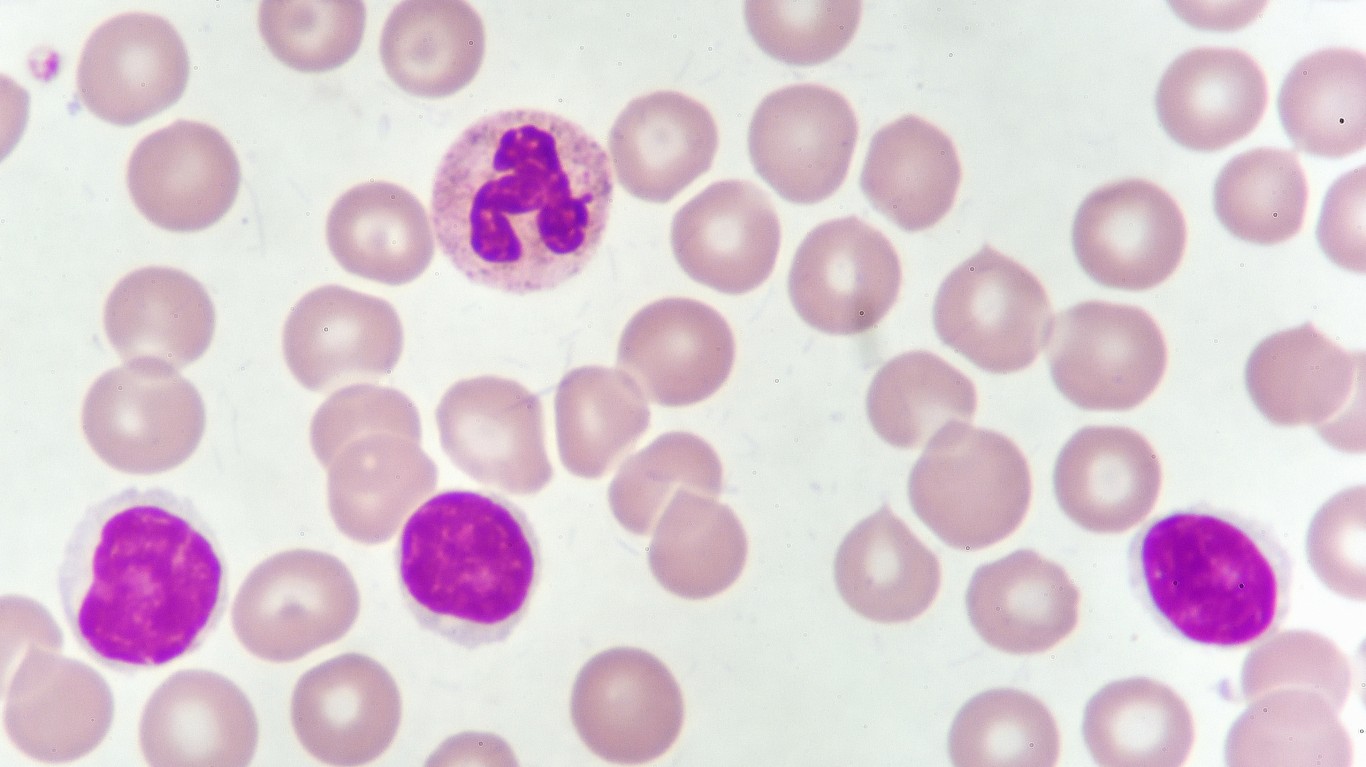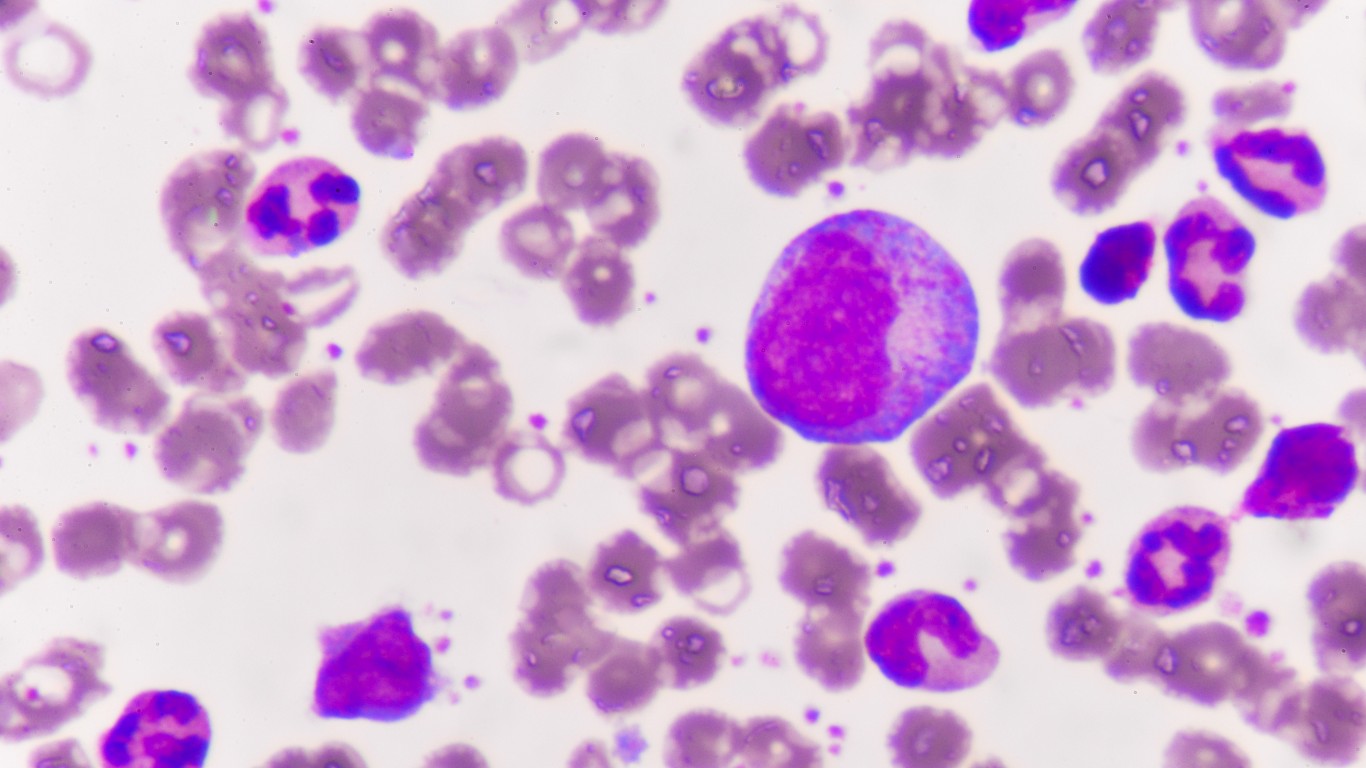
Cancer has always been with us, at least back to the days when dinosaurs roamed the earth 80 million years ago (cancerous cells have been found in dinosaur fossils).
Today, it is the second leading cause of death in the United States after heart disease (COVID comes third). More than 600,000 people succumb to various kinds of cancer each year in the U.S. (These are the states where deaths from cancer are going up.)
Despite significant strides in cancer detection and treatment over the last couple of decades that have made the illness manageable in many cases, it remains a deadly threat.
To determine the deadliest cancers in America, 24/7 Tempo reviewed cancer mortality data released in November 2022 from the Centers for Disease Control and Prevention’s WONDER database – a system for disseminating public health information and data. Cancer types are ranked based on the total number of deaths caused by each one occurring between 1999 and 2019.
Click here to see the deadliest cancers in America
Having health insurance gives people access to preventive care services that can help catch health problems, such as cancer, early, when they are easier to treat. Without coverage, people have to pay for medical expenses out of pocket, which can be very expensive, causing many people to avoid seeing a doctor for as long as possible. (These are the 21 states where the most people don’t have health insurance.)

30. Tongue
> Total number of deaths, 1999-2019: 45,090
> Incidence, 1999-2019: 237,252 — #23 highest out of 69 cancers
[in-text-ad]

29. Mesothelioma
> Total number of deaths, 1999-2019: 52,527
> Incidence, 1999-2019: 66,951 — #28 highest out of 69 cancers

28. Other non-epithelial skin
> Total number of deaths, 1999-2019: 63,996
> Incidence, 1999-2019: 111,810 — #26 highest out of 69 cancers

27. Aleukemic, subleukemic, and NOS (not otherwise specified) leukemias
> Total number of deaths, 1999-2019: 66,094
> Incidence, 1999-2019: 38,757 — #29 highest out of 69 cancers
[in-text-ad-2]

26. Larynx
> Total number of deaths, 1999-2019: 78,791
> Incidence, 1999-2019: 263,131 — #22 highest out of 69 cancers

25. Corpus uteri (endometrial)
> Total number of deaths, 1999-2019: 84,177
> Incidence, 1999-2019: 942,305 — #10 highest out of 69 cancers
[in-text-ad]

24. Cervix uteri (cervical)
> Total number of deaths, 1999-2019: 85,352
> Incidence, 1999-2019: 271,212 — #21 highest out of 69 cancers

23. Soft tissue including heart
> Total number of deaths, 1999-2019: 89,315
> Incidence, 1999-2019: 218,824 — #24 highest out of 69 cancers

22. Chronic lymphocytic leukemia
> Total number of deaths, 1999-2019: 92,864
> Incidence, 1999-2019: 341,468 — #18 highest out of 69 cancers
[in-text-ad-2]

21. Uterus and NOS (not otherwise specified)
> Total number of deaths, 1999-2019: 93,348
> Incidence, 1999-2019: 32,598 — #30 highest out of 69 cancers

20. Intrahepatic bile duct
> Total number of deaths, 1999-2019: 99,183
> Incidence, 1999-2019: 67,634 — #27 highest out of 69 cancers
[in-text-ad]

19. Other leukemias
> Total number of deaths, 1999-2019: 133,754
> Incidence, 1999-2019: 116,268 — #25 highest out of 69 cancers

18. Melanoma of the skin
> Total number of deaths, 1999-2019: 176,200
> Incidence, 1999-2019: 1,388,783 — #6 highest out of 69 cancers

17. Acute myeloid leukemia
> Total number of deaths, 1999-2019: 190,193
> Incidence, 1999-2019: 271,930 — #20 highest out of 69 cancers
[in-text-ad-2]

16. Rectum and rectosigmoid junction
> Total number of deaths, 1999-2019: 197,566
> Incidence, 1999-2019: 862,711 — #12 highest out of 69 cancers

15. Myeloma
> Total number of deaths, 1999-2019: 237,566
> Incidence, 1999-2019: 455,718 — #14 highest out of 69 cancers
[in-text-ad]

14. Stomach
> Total number of deaths, 1999-2019: 242,869
> Incidence, 1999-2019: 470,016 — #13 highest out of 69 cancers

13. Kidney and renal pelvis
> Total number of deaths, 1999-2019: 273,706
> Incidence, 1999-2019: 1,104,813 — #9 highest out of 69 cancers

12. Esophagus
> Total number of deaths, 1999-2019: 294,239
> Incidence, 1999-2019: 339,031 — #19 highest out of 69 cancers
[in-text-ad-2]

11. Ovary
> Total number of deaths, 1999-2019: 300,541
> Incidence, 1999-2019: 451,052 — #16 highest out of 69 cancers

10. Urinary bladder, invasive and in situ
> Total number of deaths, 1999-2019: 302,599
> Incidence, 1999-2019: 1,455,495 — #5 highest out of 69 cancers
[in-text-ad]

9. Brain and other nervous system
> Total number of deaths, 1999-2019: 303,296
> Incidence, 1999-2019: 450,433 — #17 highest out of 69 cancers

8. Liver
> Total number of deaths, 1999-2019: 319,541
> Incidence, 1999-2019: 454,873 — #15 highest out of 69 cancers

7. Non-Hodgkin lymphoma
> Total number of deaths, 1999-2019: 437,847
> Incidence, 1999-2019: 1,344,260 — #7 highest out of 69 cancers
[in-text-ad-2]

6. Prostate
> Total number of deaths, 1999-2019: 618,082
> Incidence, 1999-2019: 4,428,868 — #3 highest out of 69 cancers

5. Pancreas
> Total number of deaths, 1999-2019: 763,842
> Incidence, 1999-2019: 863,830 — #11 highest out of 69 cancers
[in-text-ad]

4. Miscellaneous tumors
> Total number of deaths, 1999-2019: 864,325
> Incidence, 1999-2019: 1,200,611 — #8 highest out of 69 cancers

3. Female breast *
> Total number of deaths, 1999-2019: 867,199
> Incidence, 1999-2019: 4,675,626 — #1 highest out of 69 cancers

2. Colon excluding rectum
> Total number of deaths, 1999-2019: 924,085
> Incidence, 1999-2019: 2,216,352 — #4 highest out of 69 cancers
[in-text-ad-2]

1. Lung and bronchus
> Total number of deaths, 1999-2019: 3,244,697
> Incidence, 1999-2019: 4,471,220 — #2 highest out of 69 cancers
Want to Retire Early? Start Here (Sponsor)
Want retirement to come a few years earlier than you’d planned? Or are you ready to retire now, but want an extra set of eyes on your finances?
Now you can speak with up to 3 financial experts in your area for FREE. By simply clicking here you can begin to match with financial professionals who can help you build your plan to retire early. And the best part? The first conversation with them is free.
Click here to match with up to 3 financial pros who would be excited to help you make financial decisions.
Have questions about retirement or personal finance? Email us at [email protected]!
By emailing your questions to 24/7 Wall St., you agree to have them published anonymously on a673b.bigscoots-temp.com.
By submitting your story, you understand and agree that we may use your story, or versions of it, in all media and platforms, including via third parties.
Thank you for reading! Have some feedback for us?
Contact the 24/7 Wall St. editorial team.
 24/7 Wall St.
24/7 Wall St. 24/7 Wall St.
24/7 Wall St. 24/7 Wall St.
24/7 Wall St.

